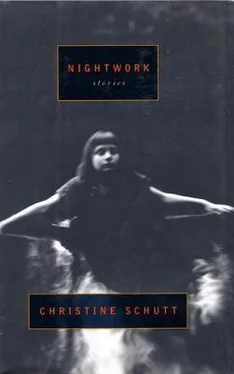“What are you writing?” she asked.
“Fuck fuck fuck fuck fuck for pages,” the daughter said, and seemed happy to say it, fuck.
In bed again, she put her hand to herself under the covers and called out to the daughter.
“No,” said the daughter, “I don’t need help.”
The daughter at the door, the journal spread against her breasts, said, “I should go to school today is what I should do.”
But the mother said, “Please, for me — stay home. We could talk about what you would like to do for the summer. Maybe I can find a way to afford it.”
She was looking for ways to afford it, ways to buy mornings with a family in another part of the world or mornings where they both might wake close enough to water. Her hand at the throat of the drawer, she was sweeping after money and talking on the phone. “You may think that living here is glamorous. You may think we’re really having fun.” Brothers and bankers — men she did not know that well, had never known or had forgotten, she called to remind them, “I have a daughter now.”
They asked, “The child doesn’t have a father? You have to live in that costly town?”
She said to the daughter, “At least here I am charmed. I am living in history.” The cobbling hoof-beats of the Horse Guards on parade, the uphill groans of buses and pauses — a sound as of the ocean, brooms against wet bricks and water-loaded leaves falling to the terrace, these sounds, she knew, and the fences and the roses and the beaded brass details, boot scrapes and doorknobs and lion’s head knockers, the cakey houses at the end of the crescent—“If I could go on living here with you,” she said to the daughter, “then I would be happy.”
“Can I see what you did?” the daughter asked, and the mother, at the mirror, showed the seams, which if anyone had thought to look or if anyone had seen her as her daughter had seen her — mouth skinned of its pleats and swollen as from a beating — he would know what she had done, and he would leave her.
“Do I look that much older?” she asked. But she saw that she was not as the daughter, walking lightly across the room, growing every day lighter, and so moving her to speak of it, to say, “You heartbreaker, you, come back here.”
“Sit with me; talk with me; tell me what you are thinking,” she said. “You never tell me what you are thinking. Do you love me anymore? Are you listening?”
The daughter, at the end of the bed, holding tails of fanned hair in front of her eyes, insisted, “I am listening.”
“I hope so,” she said to the daughter, and she shook her head with what she knew.
“What?” the daughter demanded of her.
“No, don’t,” the daughter said. “I know your dirty business.”
She told the daughter how once, traveling with another man, she was, for a day and a night, sick in a dark bedroom, with only a shared sink at the end of a narrow hallway for water. She and the man were both sick. He had the chills and so did she; they were very thirsty. In the night, he crawled along the floor to the shared sink to wet a cloth, which he carried in his mouth for her to suck on. They were unwell in an unfamiliar room and unable to tell anyone what it was they needed and afraid also of doors along the narrow hallway opening onto the sight of him, a sick man crawling with a cloth in his mouth, so that he did not make many trips, and they suffered; they held together for hours and hours, teething the same wetted cloth.
“Such ways to be pleasured,” she told the daughter. But the daughter said, “Don’t use that word — please. We are not in Arabia.”
Not in the burghers’ town, either, she reminded, not with the boys in Dutchy houses, bonnet-topped and solvent. “We are not touching up the window frames with last year’s paint.”
She said to the daughter, “You won’t be able to wear those very much longer,” and she was slinging hangered clothes onto the bed — scarf-weight dresses in slick, frictive plastic bags. “See if it fits,” she was saying. “Here’s this, this. You don’t wear a uniform on weekends. You could wear the strapless.” The old Bermuda cashmere, the Avenue shoes from a schoolgirl’s spring vacation—“Take them,” she said to the daughter. “Let me see if it fits,” and she tucked behind the bags in bed to watch the girl in furtive dressing and undressing, the scissoring shoulder blades in pulling over, pulling off.
“I don’t like this,” the daughter said. “This isn’t me.”
“Maybe not,” she said, and she was squinting at the small hardness of the girl in a skirt cocked on hipbones — a body concaved and antlered, no belly to speak of when she whispered in the lover’s ear what might arouse him, the daughter’s hair, for instance, sharp as packing cellophane your fingers raked.
“I am bleeding,” the daughter said, “my mouth.”
“Get a cloth,” she said, “ice — and not on the bed or that skirt — please, be careful.”
“I hate not being at school,” the daughter said. “I want to know what they are doing.”
She told the daughter it was passing time in school and girls were stalling in the hallways, doing what they do to one another when few men are in sight — and those men old or turned away, often given up to drinking — the girls are pressing close enough to see the wild hairs over the eye bone. They are touching, as they do — sometimes cruelly. “I know,” she told the daughter. “I have been in school.” Hanks of wiggy hair they hold as if the hair were dirtied—‘How often do you shampoo?’ they ask. ‘Let me try on your rings,’ they say, when they have never thought to ask before, wouldn’t pluck off stray hairs, wouldn’t touch the girl in the mispressed blouse rusty and freakish as a mother’s saved corsage. ‘These closet-smelly clothes,’ they are saying, ‘who wants them?’
“Stay home with me,” she said to the daughter. “Your lips are swollen. Don’t get dressed.”
Once hours on the floor doing puzzles, and even earlier, she remembered, a baby in the middle of the bed, so needful and small, she had thought she might kill it — this, and the flushed breasts inflamed from suckling. His thirst, too, the oil he used to ease past the stitches when she was milky and wounded and just to put her foot against the floor to rise from bed as lightly as she did amazed her, as the baby amazed her. “You,” she said to the daughter. “I was most afraid of open windows,” she said, “when all of my fears were of dropping you, of letting the head snap back against the sill or the sink, you slipping from my fingers into water — sometimes boiling water in the deep pot on the stove. You can imagine,” she said, “how I felt about outdoors. Days and days we stayed in; it was too hard to go out. I was afraid of your crying in public places.”
“Stay home,” she said. “You could make your bed,” she said. “If you are so ambitious, you could clean out drawers.”
“To find the things that you have left for me to find?” the daughter asked. “I’d just as soon the house was dirty. But his smoke,” the daughter said, opening windows to the roil and drawing out of curtains with a violating sound — a wind. “Fuck,” the daughter said, “I hate this house,” and the daughter moved through it, a girl loosely made and brushing against corners — reckless, willful, loud, saying, “Let’s open some windows here. Get some air.”
She followed the daughter. She put her hands over the flutter of schoolwork on the dining table and on the daughter’s desk and on the sill in the kitchen — English, found! Something she could read, not math or Latin.
“What is this?” she asked, holding away the pages, reading how it was for the girl with the man who brought home sand in his pockets, how it was for the girl beside the mother in the bed — sometimes moving against the girl, saying, “You should know what it costs just to live here.” School and food and medicine was what the daughter heard, until the daughter promised she would not be sick, but she was sick and often absent. “This assignment is late,” written at the top of homework.
Читать дальше












